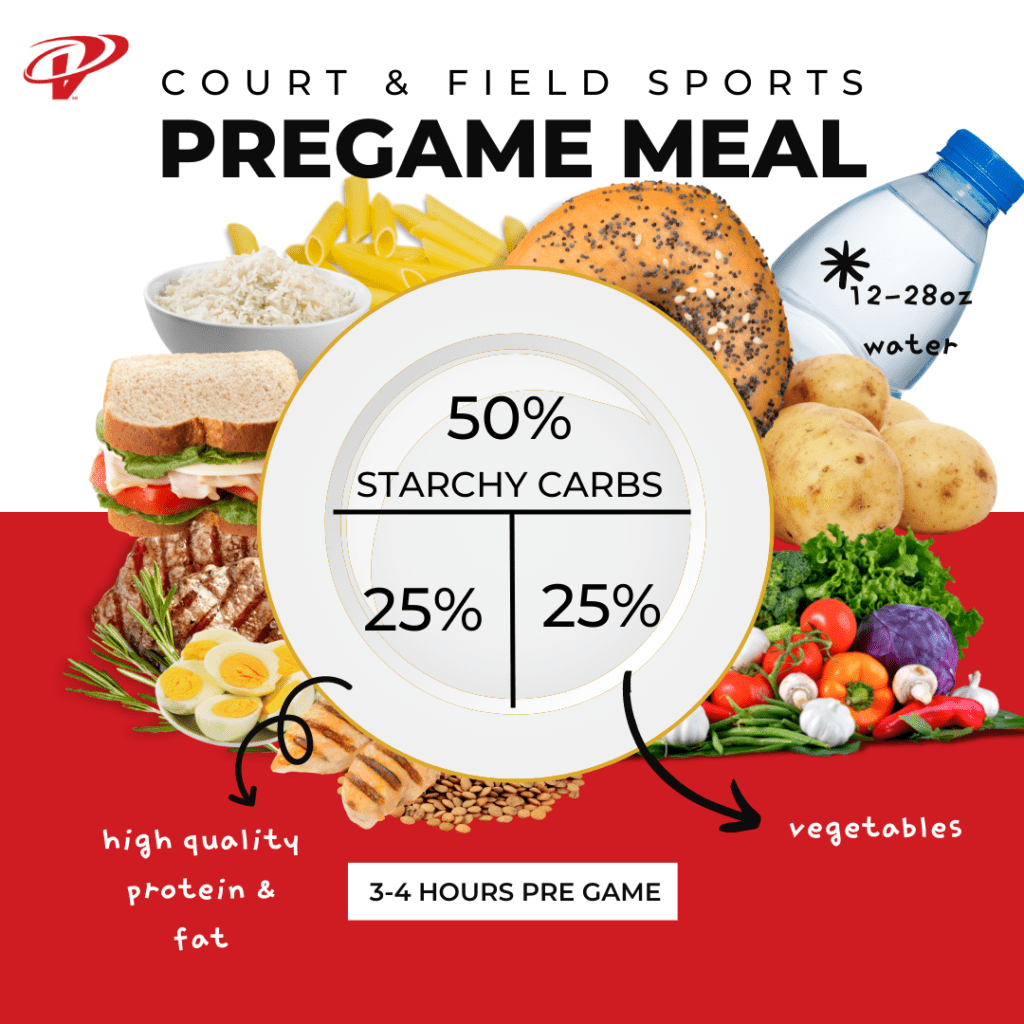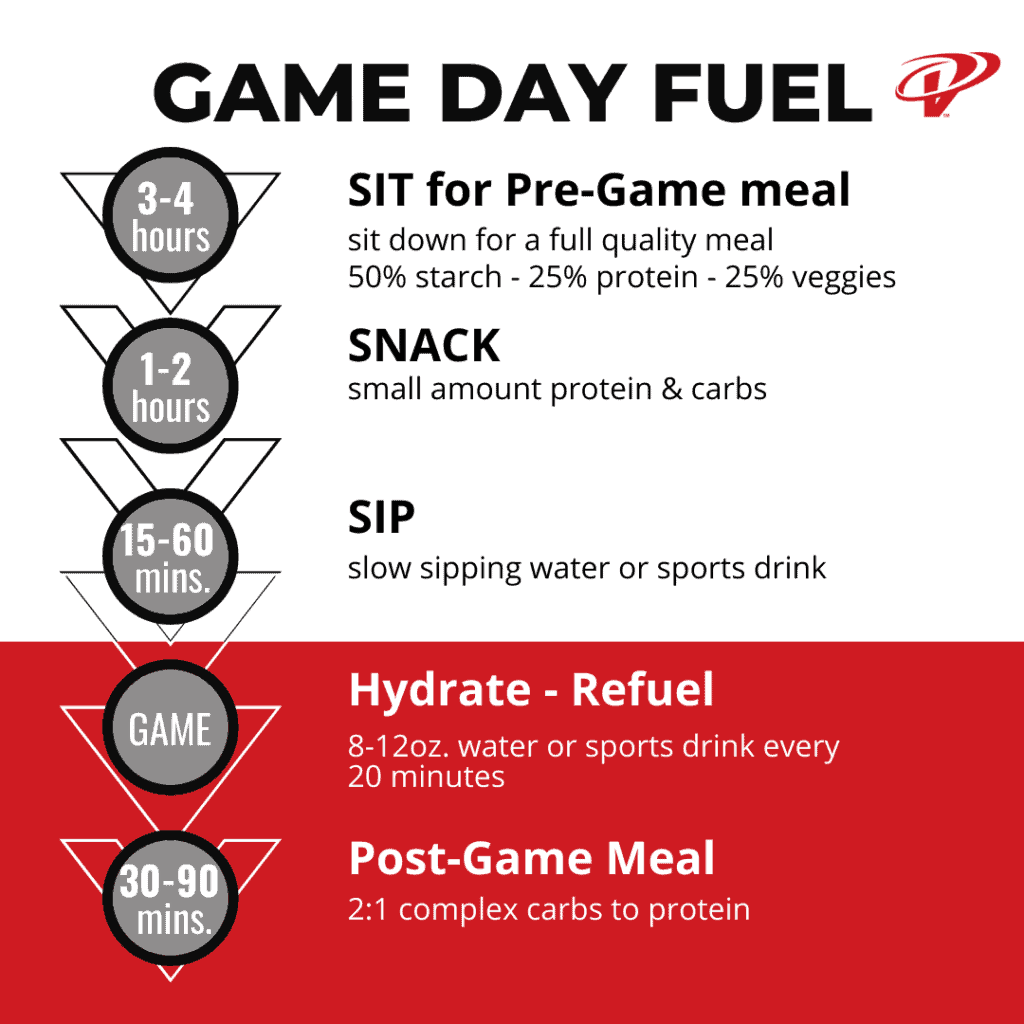有挣扎有思考有努力
记录着EATING THE NIGHT BEFORE YOUR TOURNAMENT
Top off your fuel stores by eating a high-quality carb-rich meal the night before your first game.
Remember – carbs are your body’s main source of fuel during high-intensity exercise such as team sports. That means you’ll want to eat a healthy and balanced meal with several servings of starches and a serving of healthy proteins.
Basically, it should look like your pre-game meal.
When eating out on the road, there are some things to avoid;
- Unfamiliar or extra spicy foods might be great to expand your tastes but be careful trying new foods before a competition.
- It is also a good idea to avoid high fat/fried foods that can add a lot of calories and leave you feeling heavy.
- Many fast-food choices will contain high amounts of sodium. This can leave you retaining extra-cellular water and feeling bloated.
Search the menu for options like these:
- Simple pasta dishes with red sauce. A side of chicken breast and a side salad
- Grilled chicken or beef with sweet potato and vegetables
- Burrito / bowl with grilled chicken/steak, rice, grilled vegetables, and avocado – skip the cheese and sour cream
- Deli turkey sandwich or sub with lettuce, spinach, and tomato – Go light on cheese or mayo
- Grilled chicken sandwiches with an apple and yogurt
- Rice and grilled white fish or salmon
PRE-GAME MEAL
This is the part many people focus on in their tournament nutrition plan. They have to figure out where the meals are going to be while on the go.
Your pre-game meal is going to provide the major source of fuel for your effort in the game, so make it good.
If you have an early morning game, you have the choice to get up and eat early (3-4 hours before game time) or rely on the meal the night before and top it off with morning carb & protein snacks.
This varies a lot based on individuals, so you should try to experiment ahead on some early practice days if possible.
You can usually find healthy carb options at the hotel breakfast such as toast, oatmeal, cereal, whole fruit, and juice. Pairing carbs with protein, such as eggs, yogurt, milk, and peanut butter/nuts will help hold you over throughout your first game. Eating this healthy breakfast is vital to topping off energy stores as you prepare for a long day of games.
If you have a late morning or early afternoon game, breakfast will be your pre-game meal. If not, then it will probably be lunch. Food options are generally a bit broader later in the day.

The starchy carbs are your source of fuel so you should search for:
- Pasta dishes without cheeses or cream sauces
- Rice or noodle dishes
- Baked white potatoes or sweet potatoes
- Whole grain breads
There are also some things to avoid pre-game. They are foods that take too long to digest or can upset your stomach.
- New foods
- High fat / fried foods
- Dairy
- Spicy foods
- Large amounts of raw vegetables that are harder to digest
The most important thing is to pay attention to what works for you. Experimenting at home before practices is a good way to learn what foods fuel you best without gastric distress.
PREGAME SNACKS
Depending on your per-game mealtime, or time between matches, you can take advantage of snacking smart.
The intake of a little bit of protein and carbs keeps your fuel tanks topped off going into game time. You want simple foods that aren’t hard to digest. Some ideas can include;
- Apple and some almonds or cashews
- Half a peanut butter and jelly sandwich
- Small Greek yogurt & banana
- Hard-boiled egg and an apple
- Small instant oatmeal and blueberries
Don’t ingest a bunch of simple sugars that could spike your glucose. That will then lead to an insulin spike and post sugar crash right before game time. Simple sugars to be careful of pre-game include;
- Candy
- Soda
- Juice
- Processed/packaged foods
- Many granola bars
DURING THE GAME
You want to make sure you stay hydrated and fueled during the game if you want to perform your best and reduce the risk of injury.
When you are more fatigued from low energy stores or dehydrated, your risk of injury can increase.
Not to mention there can be a cumulative effect. That means depleting your carbohydrates stores completely during one game, can make it harder to refuel for the next ones.
Experiment at practice ahead of time to find some fast digesting carb that can help you maintain energy levels.
In depends on the length and setting of your sport, but some of the foods you might try at half-time, or between periods/rounds include:
- Sports drink with electrolytes/carbs
- A few slices of orange or watermelon
- Dried fruit or Fruit snacks
- Energy gel or applesauce packets
- Fig bars
- Granola/energy bars
- A handful of gummy bears
Don’t overdo it! A small amount can go a long way and too much can upset your stomach. Consuming these during breaks will help keep your energy levels high.

POST-GAME
One of the exciting things about tournaments is getting to play a lot. However, that also puts more demands on your recovery. Thats why your tournament nutrition plan needs to consider what happens after games.
After competing, your energy stores are depleted. This is primarily the glycogen in your muscle cells. To refuel you’ll need to get carbohydrates into your body to refill your tank. But you’ll need more than that.
You’ve also used up various molecules in your body and caused microscopic damage to tissues. You’re going to need quality protein so your body can rebuild the tissue and restock its biochemistry.
And then there is the most important post-game nutrition need; hydration. You’ve probably heard that your body is mostly water. Well, that’s true.
However, just as important is the fact that the majority of your biological process requires water to operate optimally. Playing hard dehydrates and even more so in the heat.
So you need to rehydrate.
The 3 Rs approach to post-game recovery is a proven strategy.
- Refuel with fast-acting carbohydrates
- Repair (protein)
- Rehydrate (water/sports drinks)
When To Refuel Post Game
In a lot of circles, the immediate period after exercise or competition is considered the refuel power hour.
Many athletes have been known to focus on their 3Rs within the 20-minute window of finishing play.
The problem is that often you have to cool-down, change, travel back to a hotel, and then go to a restaurant. The time can add up.
And if you have another tournament game in less than a few hours, this becomes more important.
If you have more than 4 hours until the next game, you can probably go have that meal.
But often you need to stay onsite, or there just isn’t much time.
Post Game Strategy
So one of the key strategies is to have some quickly available calories right in the locker room, car, or bus.
Some of the ways to accomplish your three Rs include;
- Consume 8-20oz of water or electrolyte sports drink
- Consume a carbohydrate-containing sports drink and a whey protein shakes
- Chocolate milk is a popular choice for both its quick carbs and protein (plus it tastes good to many)
Then, if you aren’t playing again, go eat a balanced meal you know will sit well with your stomach.
With more than four hours between games you are back to the pre-game meal routine. Over the course of the tournament, just rinse and repeat.
GAME DAY NUTRITION PLAN
Now you can see that game-day nutrition is more than just the pre-game meal. A complete tournament nutrition plan starts well before the tournament.
It takes planning to be fueled for your best performance and that’s increased with multiple games at a tournament and travel.
Your plan should be based on your own personal tastes and the experimentation you tried on practice days.
By having a tournament nutrition plan, your chances of success are much higher.





